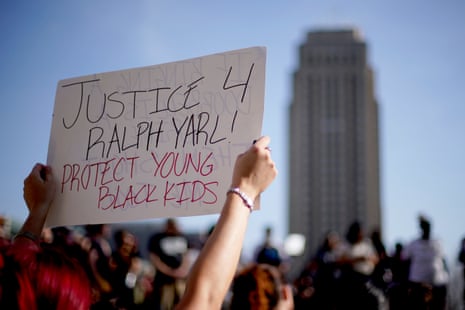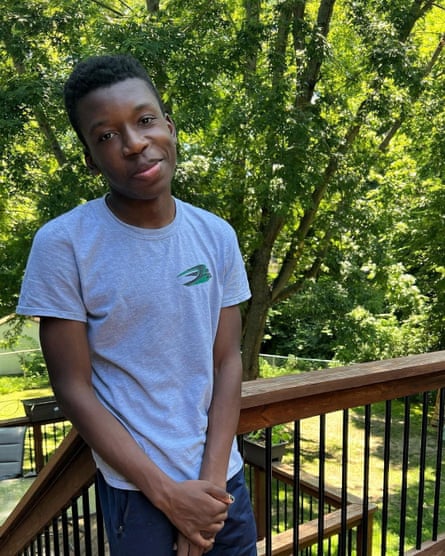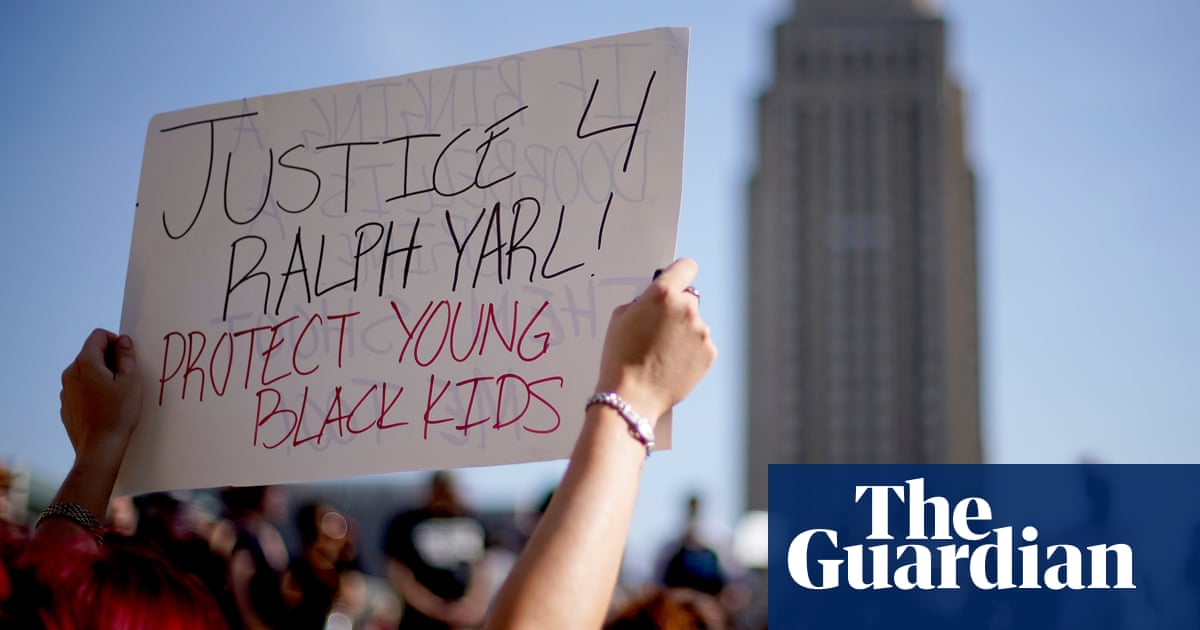
The shooting of Ralph Yarl, the Black teen who rang the wrong doorbell, revives concerns about expanding self defense laws
The shooting of a Black teenager who rang the wrong doorbell in Kansas City, Missouri, has renewed scrutiny of “stand your ground” and other self-defense laws, which have proliferated in the US and been used to justify the killings of Black Americans.
Ralph Yarl, a 16-year-old high school junior, was going to pick up his younger twin brothers from a friend’s house on Thursday when he approached an incorrect address. The white homeowner, 84-year-old Andrew Lester, came to the door and shot Yarl in the head, before shooting him a second time, according to authorities. Yarl suffered a traumatic brain injury, but survived and was recovering, his family said.
The case sparked intense local protests and widespread outrage across the country after police released Lester from custody, saying investigators were considering whether his actions were protected by self-defense laws. Late Monday, however, prosecutors announced armed assault charges against Lester, who surrendered on Tuesday.

It remains to be seen how Lester may defend himself in court. But the shooting, and another over the weekend in which a New York homeowner killed a woman who entered the wrong driveway, appeared to be part of a disturbing pattern in the US where, experts say, the dramatic expansion of self-defense laws has been linked to increased homicides and racist violence.
“Black people are still suffering from laws in this country that are not moral and not just – and ‘stand your ground’, as it is applied to Black people, is one of them,” said the Rev Vernon Howard, president of the Southern Christian Leadership Conference of Greater Kansas City.
‘Authorizing violence’
The first “stand your ground” law was adopted in 2005 in Florida after a homeowner fatally shot a man who had wandered on to his property. The shooter did not face charges, but the National Rifle Association argued he’d been treated unfairly while under investigation and pushed the passage of “stand your ground”, which solidified that people have the right to kill if they believe they’re faced with a grave threat, even if they could have retreated or de-escalated the confrontation.
“Castle doctrine” laws in the US have long allowed people to kill intruders threatening their homes, but stand-your-ground policies extended that self-defense concept to the wider public sphere – with deadly consequences.
By 2012, the year 17-year-old Trayvon Martin was killed by a neighborhood watch captain, 24 states had versions of “stand your ground”. Now, 38 states have similar statutes or equivalent legal precedents, according to a 2022 Reveal investigation. That’s despite one poll showing a decline in public support for the laws.
“The legacy of ‘stand your ground’ is this wild west mentality that everything can be resolved with guns,” said Thaddeus Hoffmeister, University of Dayton law professor.
An analysis last year found “stand your ground” laws were linked to an 8% to 11% increase in homicide rates, or roughly 700 additional deaths each year. Florida’s “stand your ground” law has increased both justifiable and unlawful killings, with one study finding a 32% increase in firearm homicide rates; and another analysis showed that in 79% of cases, the assailant could have retreated to avoid confrontation. And research on “stand your ground” laws has found huge racial disparities, with white Americans much more likely to find success with self-defense claims, particularly when they kill Black people.
“We have so much data showing these laws do not make us safer. And in fact, they authorize so much unnecessary violence that disproportionately harms Black and brown people,” said Caroline Light, Harvard senior lecturer and expert on “stand your ground” laws.

Robert Spitzer, political science professor emeritus at the State University of New York, Cortland, noted that “stand your ground” laws discourage prosecution and impede investigations into homicides, which is why some law enforcement leaders oppose them: “The laws are written in a way that quite clearly provides for the prospect of legalized murder. And it actually encourages people to make sure their opponents are dead so that they cannot make a counter ‘stand your ground’ claim.”
The laws have also contributed to an increasingly violent culture, added Kenneth Nunn, law professor emeritus at the University of Florida: “The presence of a ‘stand your ground’ law in the public’s mind generally means, all you have to say is, ‘I was in fear for my life’, and no charges will be brought, and I think a lot of police officers tend to believe that, too.”
Missouri passed a “stand your ground” law in 2016. Decried by critics as “shoot first laws”, the state’s self-defense statutes say people can use deadly force and have no duty to retreat if they “reasonably believe” it was necessary to prevent death, or in any case in which a person enters or “attempts to unlawfully enter” someone’s home.
Ari Freilich, state policy director for the Giffords Law Center, said the self-defense laws would not justify the shooting of Yarl: “There’s no state in the country where the existing laws are such that you can lawfully shoot someone for ringing the doorbell at the wrong house.” Still, he said, the case appeared to “fit the pattern we’ve seen over and over again of racist fear intersecting with really widespread unvetted firearm access, combining in our country to make gun violence the leading cause of death by far for young Black men”.
‘Traumatized and infuriated’
Residents of Kansas City – who protested over the weekend with signs saying “ringing a doorbell is not a crime” and the “shooter should do the time” – said they were relieved charges were filed, but that the shooting had escalated fears of racist violence.
“Missouri and the Kansas City metropolitan area is one of the most unsafe places for Black people in America,” said Rev Howard, citing homicide rates, police brutality, mass incarceration and infant mortality rates. “I put this shooting within that context. This is par for the course. There’s a severe lack of protection for Black life and equal justice under the law.”

He said he hopes laws like “stand your ground” are repealed, adding of the shooting, “We are not surprised, we are traumatized. We are infuriated. And we are determined to take steps to receive justice that is necessary here.”
“This is a city that has deep racial tensions bubbling constantly,” added Theo Davis, a pastor at the Restore Community Church, who attended recent protests, noting recent incidents of racism in local high schools as well as times he’d been racially profiled by police and others.
He said he was disappointed prosecutors did not file hate crime charges and was worried that decision would allow people to claim racism was not a factor. The local prosecuting attorney said there was a “racial component” to the shooting, but said hate crime statutes would carry a lesser penalty than the assault charge.
Davis said he was also anxious about the suspect’s likely self-defense argument in court: “We’ve seen so many cases of ‘stand your ground’ laws benefiting white people in this country. It’s very scary, and I’m deeply concerned. Even though it seems like a slam-dunk case, we won’t hold our breath until we see a conviction.”

